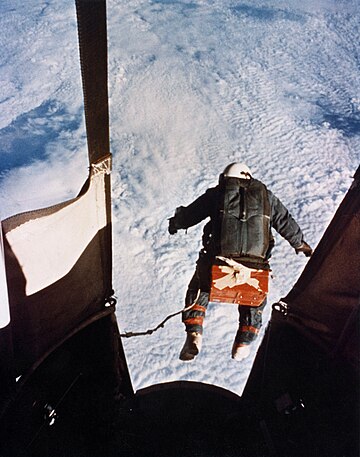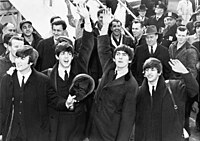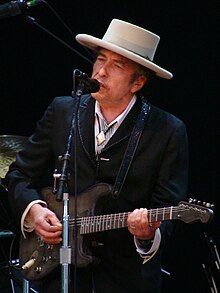The 1960s Portal
The 1960s became synonymous with the new, radical, and subversive events and trends of the period. In Africa the 1960s was a period of radical political change as 32 countries gained independence from their European colonial rulers. Some commentators have seen in this era a classical Jungian nightmare cycle, where a rigid culture, unable to contain the demands for greater individual freedom, broke free of the social constraints of the previous age through extreme deviation from the norm. Christopher Booker charts the rise, success, fall/nightmare and explosion in the London scene of the 1960s. However, this alone does not explain the mass nature of the phenomenon. Several nations such as the U.S., France, Germany and Britain turned to the left in the early and mid 1960s. In the United States, John F. Kennedy, a Keynesian and staunch anti-communist, pushed for social reforms. His assassination in 1963 was a stunning shock. Liberal reforms were finally passed under Lyndon B. Johnson including civil rights for African Americans and healthcare for the elderly and the poor. Despite his large-scale Great Society programs, Johnson was increasingly reviled by the New Left at home and abroad. The heavy-handed American role in the Vietnam War outraged student protestors across the globe, as they found peasant rebellion typified by Ho Chi Minh and Che Guevara more appealing. Italy formed its first left-of-center government in March 1962 with a coalition of Christian Democrats, Social Democrats, and moderate Republicans. Socialists joined the ruling block in December 1963. In Britain, the Labour Party gained power in 1964. In Brazil, João Goulart became president after Jânio Quadros resigned. This is a Featured article, which represents some of the best content on English Wikipedia..
On June 5, 1968, Robert F. Kennedy was shot by Sirhan Sirhan at the Ambassador Hotel in Los Angeles, California and pronounced dead the following day. Kennedy, a United States senator and a leading candidate in the 1968 Democratic Party presidential primaries, won the California and South Dakota primaries on June 4. He addressed his campaign supporters in the Ambassador Hotel's Embassy Ballroom. After leaving the podium, and exiting through a kitchen hallway, he was mortally wounded by multiple shots fired by Sirhan. Kennedy died at Good Samaritan Hospital nearly 25 hours later. His body was buried at Arlington National Cemetery. (Full article...)This is a Good article, an article that meets a core set of high editorial standards.
The English rock group the Beatles toured West Germany, Japan and the Philippines between 24 June and 4 July 1966. The thirteen concerts comprised the first stage of a world tour that ended with the band's final tour of the United States, in August 1966. The shows in West Germany represented a return to the country where the Beatles had developed as a group before achieving fame in 1963. The return flight from the Philippines to England included a stopover in Delhi, India. There, the Beatles indulged in two days of sightseeing and shopping for musical instruments while still under the attention of the press and local fans. The concerts were well attended yet provided the band with little in the way of artistic fulfilment. The programme was in the package-tour format typical of the 1960s, with two shows per day, several support acts on the bill and the Beatles' set lasting around 30 minutes. The band's setlist included their new single, "Paperback Writer", but no songs from their recently completed album, Revolver. Often marked by poor playing, the shows highlighted the division between what the group could achieve when performing live as a four-piece with inadequate amplification and the more complex music they were able to create in the recording studio. Concerts at the Circus-Krone-Bau in Munich and the Nippon Budokan hall in Tokyo were filmed and broadcast on local television networks. (Full article...)Selected picture - Joseph Kittinger sets world records for the highest parachute jump, the longest parachute drogue fall and the fastest speed by a human through the atmosphere after jumping from Excelsior III.
Did you know -
Related portalsThis is a Featured article, which represents some of the best content on English Wikipedia..
Bob Dylan (legally Robert Dylan; born Robert Allen Zimmerman, May 24, 1941) is an American singer-songwriter. Often considered to be one of the greatest songwriters in history, Dylan has been a major figure in popular culture over his 60-year career. He rose to prominence in the 1960s, when his songs "Blowin' in the Wind" (1963) and "The Times They Are a-Changin'" (1964) became anthems for the civil rights and antiwar movements. Initially modeling his style on Woody Guthrie's folk songs, Robert Johnson's blues, and what he called the "architectural forms" of Hank Williams's country songs, Dylan added increasingly sophisticated lyrical techniques to the folk music of the early 1960s, infusing it "with the intellectualism of classic literature and poetry". His lyrics incorporated political, social, and philosophical influences, defying pop music conventions and appealing to the burgeoning counterculture. Dylan was born and raised in St. Louis County, Minnesota. Following his self-titled debut album of traditional folk songs in 1962, he made his breakthrough with The Freewheelin' Bob Dylan the next year. The album features "Blowin' in the Wind" and "A Hard Rain's a-Gonna Fall" which, like many of his early songs, adapted the tunes and phrasing of older folk songs. He released the politically charged The Times They Are a-Changin' and the more lyrically abstract and introspective Another Side of Bob Dylan in 1964. In 1965 and 1966, Dylan drew controversy among folk purists when he adopted electrically amplified rock instrumentation, and in the space of 15 months recorded three of the most influential rock albums of the 1960s: Bringing It All Back Home, Highway 61 Revisited (both 1965) and Blonde on Blonde (1966). When Dylan made his move from acoustic folk and blues music to rock, the mix became more complex. His six-minute single "Like a Rolling Stone" (1965) expanded commercial and creative boundaries in popular music. (Full article...)This is a Good article, an article that meets a core set of high editorial standards.
Fidel Alejandro Castro Ruz (/ˈkæstroʊ/ KASS-troh, Latin American Spanish: [fiˈðel aleˈxandɾo ˈkastɾo ˈrus]; 13 August 1926 – 25 November 2016) was a Cuban revolutionary and politician who was the leader of Cuba from 1959 to 2008, serving as the prime minister of Cuba from 1959 to 1976 and president from 1976 to 2008. Ideologically a Marxist–Leninist and Cuban nationalist, he also served as the first secretary of the Communist Party of Cuba from 1965 until 2011. Under his administration, Cuba became a one-party communist state; industry and business were nationalized, and socialist reforms were implemented throughout society. Born in Birán, the son of a wealthy Spanish farmer, Castro adopted leftist and anti-imperialist ideas while studying law at the University of Havana. After participating in rebellions against right-wing governments in the Dominican Republic and Colombia, he planned the overthrow of Cuban president Fulgencio Batista, launching a failed attack on the Moncada Barracks in 1953. After a year's imprisonment, Castro travelled to Mexico where he formed a revolutionary group, the 26th of July Movement, with his brother Raúl Castro and Ernesto "Che" Guevara. Returning to Cuba, Castro took a key role in the Cuban Revolution by leading the Movement in a guerrilla war against Batista's forces from the Sierra Maestra. After Batista's overthrow in 1959, Castro assumed military and political power as Cuba's prime minister. The United States came to oppose Castro's government and unsuccessfully attempted to remove him by assassination, economic embargo, and counter-revolution, including the Bay of Pigs Invasion of 1961. Countering these threats, Castro aligned with the Soviet Union and allowed the Soviets to place nuclear weapons in Cuba, resulting in the Cuban Missile Crisis—a defining incident of the Cold War—in 1962. (Full article...)Selected article -
Black is beautiful is a cultural movement that was started in the United States in the 1960s by African Americans. It later spread beyond the United States, most prominently in the writings of the Black Consciousness Movement of Steve Biko in South Africa. Black is beautiful got its roots from the Négritude movement of the 1930s. Negritude argued for the importance of a Pan-African racial identity among people of African descent worldwide.
The movement aims to dispel the racist notion that black people's natural features, such as skin color, facial features, and hair, are inherently ugly. The movement also encouraged men and women to stop trying to eliminate African-identified traits by attempting to lighten or bleach their skin. John Rock was long thought to be the first person to coin the phrase "black is beautiful"—during a speech in 1858—but historical records indicate that he never actually used the specific phrase on that day. Bill Allen, a freelance writer for advertising agencies, claimed he coined the phrase in the 1950s. (Full article...)
More Did you know (auto generated)
TopicsCategoriesWikiProjects
Associated WikimediaThe following Wikimedia Foundation sister projects provide more on this subject:
Discover Wikipedia using portals |

Sons of Union Veterans of the Civil War




























